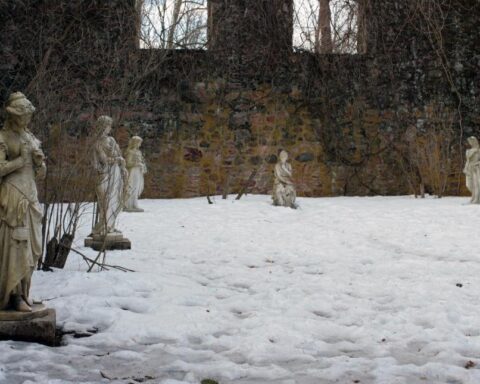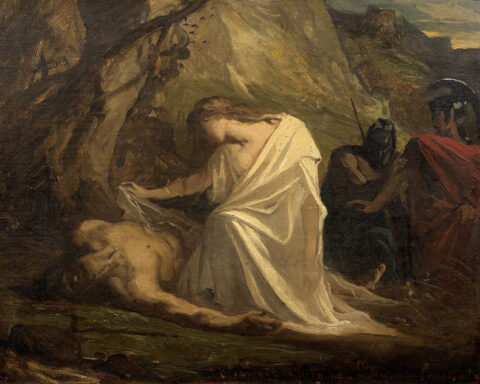“Does fire attract crowds?”
Expecting an answer is an unshaven guy with penetrating eyes, long blonde hair and a tiny microphone clipped to his scruffy yellow shirt. On the sidewalk behind him sits a large, black speaker, volume cranked high.
Who is he talking to? I wonder, looking side to side, hoping he’s asked someone else – but no one pays any attention.
We’re likely the same age; being called “sir” makes me cringe.
Bowling pins, Frisbees, tennis, soccer and basketballs, dinner plates and other fine china are spread in an arc on the sidewalk around him, marking the impromptu stage of a street performer. A glittery silver top hat sits, upended, where footlights should be, separating the busker from an imaginary audience.
“Of course it does.” My words sound angry, and I am, though not at him.
“Yes, ladies and gentlemen, fire attracts crowds.” His words boom across open space, echoing off ornate stone facades of Ottawa’s oldest street, closed to vehicles and lined with boutiques and cafes. Droves of people saunter past, paying no heed.
Leaning forward to take another step, I check my watch as though in a hurry. The busker dips a steel baton, with black sponge-like material on each end, into a small white bucket. Liquid drips onto the sidewalk, releasing the pungent aroma of kerosene. Retrieving a disposable lighter from his pocket, he holds it to the wet end of the torch. It bursts into golden flame, sending plumes of dark brown smoke soaring into dusky twilight.
Wondering what’ll happen next, I feel heat as my eyes follow the flame.
The performer steps closer. “How many spectators were here a minute ago?”
“Just me.”
“How many now?” He is confident, smug.
Tearing my eyes from the blaze, I discover an encircling throng, eager as moths. “I can’t even count, they’re still swarming.”
“And what did I tell you?”
We say it together: “Fire attracts crowds.”
Thirty minutes earlier, my uptight, militaristic boss also mentioned fire. In his tiny, airless office, the front desk supervisor invited me to sit. Unaware what my infraction might be, I focused on a white object in his beard. A bread crumb? Something from his nose?
“There was a negative comment in yesterday’s guest reviews.”
“I had no idea.”
“Are you rude to our guests?”
“Never knowingly.”
“Hmm. Well, Mr. Atkins feels otherwise.” Fixated on his glowing screen, he raised his shoulders, lowered his head, and read: “Jonathan at check in was arrogant and surly. He belittled me in front of my wife.” While reading, the white flake fell from his beard. He looked down, brushed his lap, then looked up, as though whatever fell came from the ceiling.
My memory of the encounter differed. “I remember checking him in. He insisted he had an Executive Suite but booked a Premium Guest Room. I just showed him the information on my screen.”
My boss shrugged with indifference. “Perceptions matter. Someone on vacation wouldn’t put pen to paper unless they were unhappy with your attitude, which has been on fire lately. We can’t have this behaviour. I promise you, we will stamp this fire out.”
It was his favourite analogy. Unfortunately, smothering flames with the souls of his employees was the only firefighting technique in his repertoire.
Humiliated, wanting to quit, I wandered homeward, seeking stray ants on the sidewalk and going out of my way to crush them. My job was a means to an end; travel was the goal. In a year, I could transfer to any of Starwood’s fifteen hundred hotels around the globe. I had Prague in mind, Athens and the south of France.
“But there’s more to my act than fire.” The busker reclaims my attention. Balancing the long torch on his chin, he pulls six white golf balls from his pocket and juggles them in a frantic, sideways eight pattern. Gleaming streaks of light paint a mesmerizing symbol of infinity above the juggler’s head.
Without breaking the flow, he swipes the torch with one hand and rams it upright into a stand. Backing away, he introduces a red ball into the configuration. The trajectory is so rapid, red turns pink as glowing colours blend.
In the waning firelight, he juggles every item laid out around him, several pieces at a time. Each graceful toss has an element of magic. Whether a bowling ball, teacup or hockey puck, objects leave one hand and travel in a perfect arc as though telepathically guided toward the other hand. The illusion shatters when a dinner plate smashes to the ground, sending shards in every direction. One splinter brushes my pant leg and lands beside my shoe. A collective “oooohhhh” rises from the crowd.
“Rats. My grandmother will be furious when she notices that’s missing.”
Undaunted, the artist continues manipulating gravity. Talking non-stop, he describes how he got started (he wanted to entertain, his dad wanted an athlete – juggling sports equipment seemed a reasonable compromise), he reveals the craziest things he’s ever juggled (bicycles) and speculates what he might be when he grows up (a designer of funny protest placards – to make people laugh in tense situations).
Had I really expected him to say hotel clerk?
I imagine what my father will say if I lose my job. He isn’t a happy man, my dad, Master Warrant Officer T. E. Chisholm. Hardened by a long, nomadic, military career, his legacies to me are wanderlust and resentment of authority. But living in my maternal grandmother’s basement, perhaps I can keep the news from him, if it comes to that. He still doesn’t know about my comedy routine on open mic night.
Again, the busker hauls me back. “How many people when we started?”
“Just me.”
“How many now?”
“Maybe fifty.”
“How do we get an even bigger crowd?”
I point to the extinguished torch. “With fire.”
“Why is that?”
We answer together, his amplified voice eclipses mine. “Because fire attracts crowds.”
Retrieving the torch, he soaks each end in fuel and ignites both sides. More spectators approach. Setting the baton horizontally in its stand, he grabs two short steel poles, their ends slightly curved.
“Now keep back.” Lifting the torch using both wands, he twirls it, end over end. Careful manipulations twist the flames in wild directions, they swoop and rise. Against the dark sky, streaks of flaring light become hypnotic.
“No seriously, stand back, if you think I have insurance covering third degree burns, you would be mistaken. Whatever happens, don’t try catching this thing with your face.”
Tittering nervously, everyone manages an incremental retreat as he lobs the baton and catches it on the sticks. He repeats this to bursts of applause as flames hover longer and reach higher.
The entertainer pauses his monologue for each throw and catch. “These flames burn in excess of two thousand degrees Celsius . . . that’s more than thirty-six hundred Fahrenheit for my American friends. For anyone else . . . that is wicked hot.”
In unison, we take another step back.
“Each throw lifts the flames higher and . . . my chances of missing grow greater, so I’ll add to the drama by executing one stunning pirouette . . . before each . . . catch.”
Losing balance at the critical moment, the entertainer makes contact with one side of the baton, but misses the other, and the fiery shaft strikes the sidewalk, perpendicular to the ground. Shooting sparks, it springs toward the audience. Landing before a small family with two young children, the second bounce magically reverses the flaming torch’s direction. The busker drops both sticks and seizes the projectile with one hand.
Eyes wide, wiping his brow, the flame thrower exclaims: “I meant to do that.”
Some laugh, some applaud, others look as though they’ve witnessed a miracle. Several sitting near where the torch landed, stand and edge farther away.
He closes his eyes, lowers his head and takes a deep breath. “Okay, I didn’t mean to do that – but how about that lucky bounce, huh?” When a dozen people clap, he begs: “Don’t applaud mistakes. I’ll never learn that way.”
Composure regained, the juggler resumes maneuvering the blazing rod, throwing it higher into the atmosphere, counting each rotation, then snaring it after an artful spin.
“We’re up to seven mid-air rotations in a single throw. Who thinks I can do ten – without severely burning anyone in the front row?”
The small family, who narrowly escaped a scorching, shake their heads. Many more shout encouragement.
“Wow, some of you actually believe. Let me assure you, it’s impossible.”
Several onlookers laugh. “Aw, come on,” shouts a fellow next to me.
“Trust me, it can’t be done. My all-time record is eight. Do you know how high I’d have to throw to complete ten rotations? The equivalent of a six story building.” He pauses, then speaks faster: “But I need a big finale if I want you to fill that top hat with donations.” He exhales. “So, here it goes.”
Leaning over, the entertainer forcefully heaves, launching the torch with a resounding grunt. Every pair of eyes follows the spinning fires skyward. Audience members count aloud with the flame thrower. Twin flares rise far above the nearest rooftops, casting shining circles of light against a starlit backdrop. We reach “five” before the downward trajectory begins.
He’ll make it if the projectile falls at the same speed it ascended. Getting to ten before those flames reach the ground is the one thing on my mind. I want to laugh but I’m too busy counting. Others hold their breath.
At “nine,” the baton falls hard to earth, flat on the interlocking, redbrick sidewalk. There’s a thud, not a bounce, and a brilliant sputter of flames.
The world stops as one hundred witnesses process this shocking result. Our street performer is gone. He’s silent. He’s vanished. Anticipating only two potential outcomes, this unexpected conclusion is as jarring as a movie theatre power outage, during the climactic final scene.
There are no words, only gasps, as we register failure and disappearance. Is this part of the act or has he fallen down a sewer? Seconds pass before one man is able to shake his head and sputter: “What? Where?” We turn left, right, searching for the lost artist, seeking explanation. Stunned, we wonder how he escaped through the dense crowd.
Gaping silence lingers until the sound system blares: “I told you it was impossible.”
Laughter erupts, though many remain confused. We’ve no idea where he’s speaking from. Then someone in a black, hooded sweatshirt, carrying a grey canvas bag, stands and walks toward the blazing, forgotten baton. Sweeping back the hood, we recognize the busker.
“I’m here. I’ve been here all along. You’ve just experienced misdirection. While everyone followed my flaming torch into the sky, I had time to change clothes and take a seat.” Laughter intensifies, applause rises. “I even had time,” he reaches into the canvas bag, pulling out what looks like a tan piece of leather, “to borrow your wallet.”
The item is handed to a tall man in a sleeveless top and cut-off jeans. Before taking it, the owner checks his back pocket. Discovering the theft, his mouth falls open.
“And your baseball cap.” A hat with a logo is presented to a grinning oaf, wearing a jersey sporting the same crest. Patting his head, he looks up in astonishment.
I suspect the thievery is staged until he approaches me, holding a familiar watch. “And your fake Rolex.”
“Mine isn’t fake,” I lie and raise my left arm to show him. Only then do I notice my wrist is bare. “How’d you . . . ?”
Walking home, my mind replays the scene. Not when I noticed the missing watch but those tense and confounding seconds preceding it. All eyes looked up, and up, and up. When we finally looked down, the busker was gone, leaving only stunned silence. And possibilities.
It’s a lesson I’m determined to apply. Tomorrow, when I’m expected at work, the front desk supervisor can wait, and wait, and wait, until some other fire captures his attention. Meanwhile, I will learn to juggle – and busk my way around Europe, one street performance at a time.



